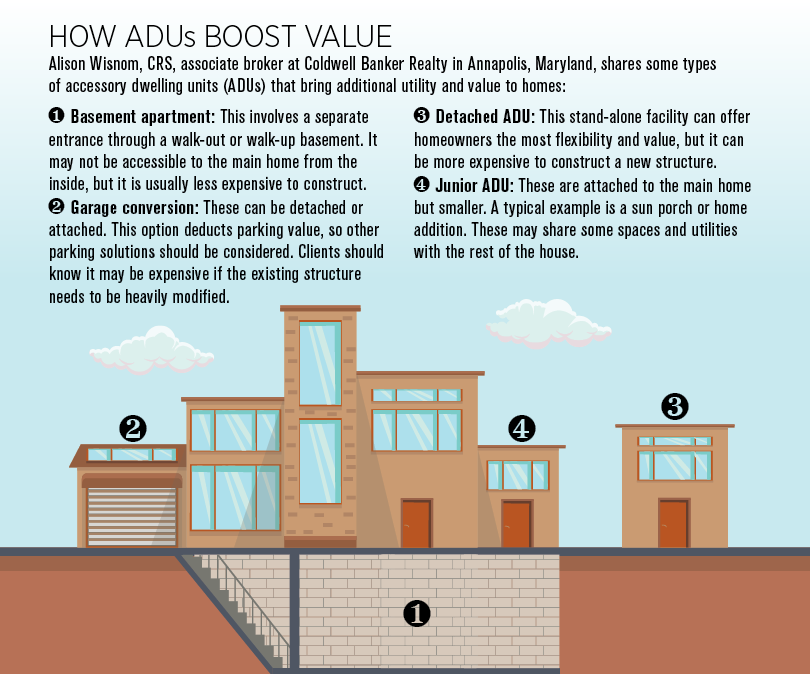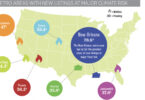Adding an accessory dwelling unit (ADU) to a property can increase its appeal and value
By Rebecca Lubecki
Homeowners and residential real estate agents alike are often looking to increase a property’s monetary value or its utility. For some, those desires can be fulfilled by creating an accessory dwelling unit (ADU). ADUs are additional living spaces added to a homeowner’s property to provide extra income as a rental or more space for their own family. While they’re not legal in every city or county, ADUs are increasing in popularity as more jurisdictions allow for their construction, and agents should take notice and prepare properly.
Alison Wisnom, CRS, associate broker at Coldwell Banker Realty in Annapolis, Maryland, explains what agents need to know and the benefits their clients can gain from legalizing ADUs.
“ADUs could be very popular in our market, except that most jurisdictions don’t allow them. My city has allowed them only for the past two years. The county I live in has allowed them only for the past few months. There’s no statewide policy for them within single-family zoning,” Wisnom says. “We have different rules around the state, and many places are not allowing them at all, so it’s difficult to navigate.”
Why are ADUs illegal in some areas?
So why do these strict laws against ADUs exist in the first place? According to Wisnom, it goes back to the history of zoning.
“Zoning was intended originally to restrict incompatible uses for health and safety purposes. You don’t want a train track running down the middle of the street where your kids play or a chemical plant next to your house,” she explains. “Historically, in our country, local officials have also instituted other kinds of restrictions on how people can use their properties.”
While zoning laws have come under criticism in recent years for their class and racial biases, they still exist. Wisnom says one reason ADUs get pushback is that some are used as rental properties for extra income. A negative connotation associated with renters is that they’re more transient or less wealthy. There are also concerns that with more people living in these additional housing units, parking spaces will decrease or additional improvements like ADUs will increase property taxes in the community. But well-managed ADU policies exist, and we can take lessons from them.
How clients benefit
Depending on your client’s situation, an ADU could be a key make-or-break decision. A home with an ADU (or potential to add one) can provide a huge benefit for families with:
- Elderly parents or grandparents
- Adult children with disabilities
- Adult children returning home
- Live-in caregivers
- Need for supplemental income (renting out the space)
- Need for a flex space, like a guest room or home office
ADUs give families the flexibility to offer certain family members or caregivers the privacy they need while remaining together. They can also be a great option for those who want to rent out part of their home to help pay their mortgage.
What agents should know
ADUs may not be a good fit for everyone, but not offering them as an option limits a home’s potential utility and value for the owner and further restricts the housing supply. That’s why residential real estate professionals must know the rules in their local markets.
“For example, I had a client who wanted to buy a single-family home outside Baltimore. The seller had moved his mother into his basement so he could help her, and she had a second kitchen that was not allowed in that location. When the appraiser came, the owner was required to remove the gas stove,” she says. “This person wasn’t allowed to use his property in a way that he has a legitimate need to.”
Agents should also get involved with their local government to create zoning solutions that serve their clients in the long run.
“It’s a government restriction on what a person is allowed to do with the property that they bought,” Wisnom says. “You should be able to use your property in the way you need, as long as it’s not affecting your neighbors’ use and enjoyment of their properties.”

Become a listing expert with RRC’s Residential Listing Certification at CRS.com/certifications.
Photo: iStock.com/Eoneren








